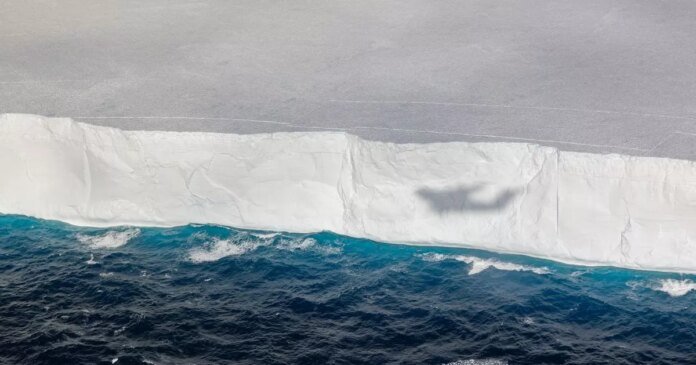An alarming development has been reported regarding a massive iceberg, equivalent in size to a Hawaiian island, now observable from space. The colossal A23a, recognized as the world’s largest glacial mass, is currently drifting across the Antarctic Ocean. Recent observations indicate the presence of water pooling on the iceberg’s surface, accelerating the melting of Antarctica beyond previous projections. Notably taller than London’s Shard, the immense iceberg has shown signs of structural deterioration.
According to a new Nature study report by the Australian National University, there is a growing awareness of potential sudden changes in the Antarctic environment, although less understood compared to the Arctic. Lead researcher Professor Nerilie Abram warns of catastrophic consequences for future generations due to rapid environmental transformations across Antarctica’s ice, oceans, and ecosystems exacerbated by global warming.
Measuring 1,400 square miles, which is roughly the size of Cornwall or twice the area of London, A23a has significantly reduced in size since breaking off from Antarctica in 1986. Portions of the iceberg have continuously broken away, falling into the ocean below.
While stationed on the vessel Pharos in South Georgia, sea captain Simon Wallace expressed hope that the iceberg would avoid collision with the island or change its course entirely. The potential impact of a collision could endanger local wildlife by obstructing their access to vital food sources. South Georgia is a habitat to various penguin species, seals, sea birds, and serves as a significant location for migrating whales.
Dr. Andrew Meijers, a Physical Oceanographer at the British Antarctic Survey, explained the reasons behind the iceberg’s collapse. The movement of iceberg A23a towards South Georgia has been attributed to prevailing currents, potentially posing a threat to the island’s wildlife feeding grounds if the iceberg were to become lodged in the area.
Overall, the situation remains critical as the iceberg’s trajectory raises concerns about its impact on the delicate ecosystem of South Georgia.

